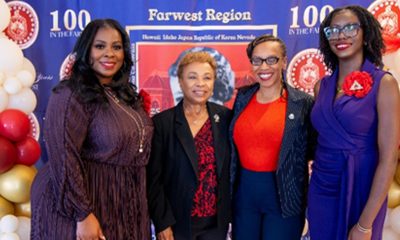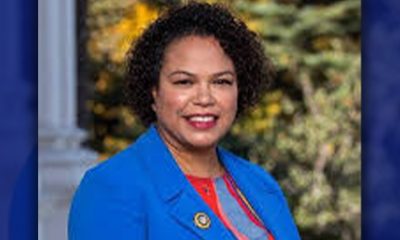Opinion
OP-ED: California Cover Up?
By Winslow Rouse
Between 1999 and 2007, public records suggest the judges of the State of California disobeyed the legislature by issuing a whole generation of mandatory restraining orders on void and unenforceable Judicial Council forms. The result was the false arrests and jailing of possible over 12,000 young men between the ages of 25 and 34, who were taken from their communities without notice or probable cause.
According to public documents, despite the requirements of amended Family Code Section 63899 (f) and the new Penal Code Section 12021 (g)(3), on January 1, 2000 the judicial Council republished the unrevised January 1, 1999 editions of three of the most widely used restraining order forms, the DV-110 (Order to Show Cause and Temporary Restraining Order), the DV-130 (Restraining Order After Hearing), and the MC-220 (Protective Order in Criminal Proceeding).
These forms each contained a Notice Regarding Firearms printed in bold type which prohibited respondents from purchasing or receiving a firearm while subject to a restraining order, but failed to prohibit owning or possessing a firearm. They were also ambiguous, telling respondents that while the courts have the authority to order the surrender of firearms, it is only if a restraining order is issued at the noticed hearing that respondents may then be required to give up their firearms.
It was not until July 1, 2000, that the Judicial Council revised the Notice Regarding Firearms in these forms to warn respondents they were prohibited from owning, possessing, purchasing, or receiving a firearm while they were subject to a restraining order. The revision informed respondents that at the hearing on the matter the court will order them to give up any firearms they may already own or possess.
California’s judges were allegedly told on four separate occasions that these orders were void. The courts simply disregarded the requirements of the newly enacted Senate Bill 218 (1999) and the legally binding decisions of their own governing agency, the Judicial Council of California, which unmistakably informed the judges that every restraining order form published after a legislative deadline of January 1, 2000, was void and unenforceable.
Because void orders do not, never did, and never can legally exist, no statute of limitations bars lawsuits to set void orders aside. So now, possibly thousands of people who were harmed by these void forms can sue for the damage they have suffered, which could total billions of dollars.
Judges are required to know the law, so every judge who issued, upheld or enforced one of these void restraining orders knew or should have known that the judicial Council forms on which the restraining orders were issued were themselves void and unenforceable.
Because void orders convey no jurisdiction, the courts had no authority over these void orders except to set them aside, which they have yet to do.
Since the courts had no jurisdiction over these void orders, the judges involved in this cover-up have no defense for their misconduct. For the last twelve years the judiciary has been scrambling to cover up these void orders, even though that has required the false arrest, conviction, and imprisonment of thousands of innocent people.
Activism
Oakland Post: Week of November 26 – December 2, 2025
The printed Weekly Edition of the Oakland Post: Week of November 26 – December 2, 2025

To enlarge your view of this issue, use the slider, magnifying glass icon or full page icon in the lower right corner of the browser window.
Activism
Oakland Post: Week of November 19 – 25, 2025
The printed Weekly Edition of the Oakland Post: Week of November 19 – 25, 2025

To enlarge your view of this issue, use the slider, magnifying glass icon or full page icon in the lower right corner of the browser window.
Activism
Oakland Post: Week of November 12 – 18, 2025
The printed Weekly Edition of the Oakland Post: Week of November 12 – 18, 2025

To enlarge your view of this issue, use the slider, magnifying glass icon or full page icon in the lower right corner of the browser window.
-

 Activism4 weeks ago
Activism4 weeks agoOakland Post: Week of November 12 – 18, 2025
-

 Activism3 weeks ago
Activism3 weeks agoIN MEMORIAM: William ‘Bill’ Patterson, 94
-

 Activism4 weeks ago
Activism4 weeks agoHow Charles R. Drew University Navigated More Than $20 Million in Fed Cuts – Still Prioritizing Students and Community Health
-

 Bay Area4 weeks ago
Bay Area4 weeks agoNo Justice in the Justice System
-

 #NNPA BlackPress3 weeks ago
#NNPA BlackPress3 weeks agoLewis Hamilton set to start LAST in Saturday Night’s Las Vegas Grand Prix
-

 #NNPA BlackPress2 weeks ago
#NNPA BlackPress2 weeks agoBeyoncé and Jay-Z make rare public appearance with Lewis Hamilton at Las Vegas Grand Prix
-

 Activism2 weeks ago
Activism2 weeks agoOakland Post: Week of November 19 – 25, 2025
-

 #NNPA BlackPress4 weeks ago
#NNPA BlackPress4 weeks agoThe Perfumed Hand of Hypocrisy: Trump Hosted Former Terror Suspect While America Condemns a Muslim Mayor


























































